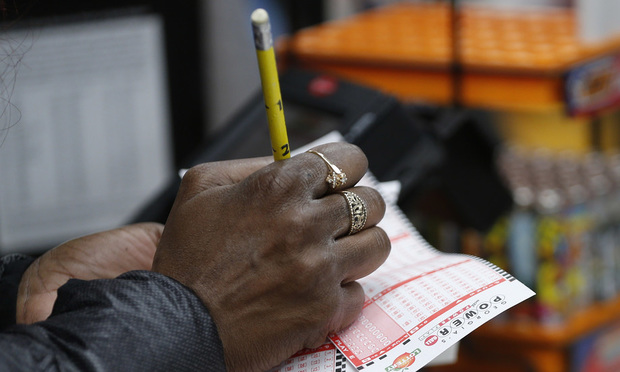Lapsed Lawyer Faced Legal Fights Over Fantasy Football Before Fraud Indictment
A former lawyer with Turner Broadcasting whose Georgia law license lapsed in 1998 faced civil litigation over failing to pay his employees and over the rights to a fantasy football lottery patent that was later abandoned.
December 07, 2018 at 04:33 PM
7 minute read
 (Photo: John Bazemore/AP)
(Photo: John Bazemore/AP)
Six years after a former in-house lawyer at Turner Broadcasting first tried to market the prospect of a fantasy football game for the Georgia Lottery, his 2012 brainchild has turned into a litigious nightmare.
When Timothy F.S. Cobb was arraigned on federal wire and tax fraud charges on Nov. 27 in Atlanta, U.S. Attorney Byung J. “BJay” Pak said Cobb allegedly “gambled on getting away” with duping two investors of a combined $500,000.
But the unnamed investors were not the only ones Cobb, whose law license elapsed in 1998, apparently gulled into buying into his fantasy concept.
Court records show Cobb was sued by two of his former employees over unpaid salaries. One, the former executive vice president of the company Cobb originally founded, Sportzerry, countersued Cobb over the rights to the fantasy football concept after Cobb sued him.
The indictment, handed down by a federal grand jury in Atlanta on Nov. 14, accuses Cobb of spending investors' money on himself for trips and dining rather than on developing, patenting and marketing his fantasy football lottery concept.
Cobb did so while reporting an adjusted gross income of $37,164 in 2014 when he first secured the investment funds, and just $216.62 in 2015, the indictment says. The unreported earnings that constituted tax fraud were the investor funds he allegedly converted to his own use, the indictment alleges.
Cobb has pleaded not guilty to the charges and is currently free on a $20,000 signature bond. Cobb's counsel of record, Atlanta attorney Manubir “Manny” Arora, declined to comment.
But the two civil suits filed years before the indictment offer a window into Cobb's business dealings as he sought to develop and market the fantasy football concept in 2012.
Anna Ruth Williams sued Cobb three months after he hired her in May 2012 to be the communications director for Sportzerry and a subsidiary, F-52 Sports. He promised her $5,000 a month, benefits and stock options in the newly-created companies, according to her federal lawsuit.
Cobb never paid her, according to Williams' complaint. Instead of a paycheck, Cobb blamed banking errors and financing difficulties. Eventually, Cobb offered to compensate her with gift cards that also never materialized, the complaint said.
After two months, Williams quit and sued Cobb for $10,880 in back wages. Cobb claimed he told Williams when he hired her that she would not be paid until the company obtained financing and that she had agreed.
Cobb hired King & Spalding partner David Balser to defend him. Balser said he was local counsel “for a very short period of time” to “help out” Washington attorneys Kevin Bell (formerly of Atlanta's McKenna Long & Aldridge) and Richard Oparil, then of Patton Boggs, who were listed as of counsel. Both attorneys are now principals at Porzio, Bromberg & Newman in Washington, D.C. They could not be reached.
In January 2013, Balser bowed out of the suit and was replaced by Jameson Carroll of Atlanta's Carroll & Weiss. On Feb. 26, 2013, Williams secured a consent judgment for all her back wages and an additional $8,054 in legal fees, according to court records.
Carroll said he and Cobb met in law school, and their children played high school football together. “I took the case on as a favor to Tim after he parted ways with prior counsel,” he said. “Tim resolved it soon after our appearance, and we didn't do much. I don't think I've run into Tim since then.”
Cobb finally satisfied the judgment 21 months later, according to court records.
In 2015, after he had secured money from two investors, Cobb sued former employee Anthony Scott Oddo, a Massachusetts inventor Cobb hired to help create the fantasy football game. The lottery game would be based on athletes' actual performances from week to week.
Cobb claimed Oddo attempted to lay claim to the intellectual property rights to the fantasy football lottery concept. Oddo countersued.
Cobb hired Oddo in January 2012 to be Sportzerry's executive vice president of product development. According to Oddo's counterclaim, Cobb lacked the technical knowledge “to calculate and manipulate odds of games or to engage in the statistical analysis of chance-based lottery games necessary to create marketable sports-inspired lottery games.” Cobb promised Oddo an equity interest in Sportzerry and $140,000 a year to develop the game, Oddo's counterclaim alleged.
Oddo was initially concerned Cobb lacked adequate capital, but Cobb said he had people committed to investing “millions” in his venture, Oddo's counterclaim said.
Four months after Oddo hired on, they applied for a patent for a fantasy football game that could extend to other sports, and Cobb opened negotiations with Atlanta-based Scientific Games, a Georgia Lottery vendor, to sell the licensing rights.
“Both lotteries and fantasy sports leagues are popular forms of entertainment,” the patent application stated. “Existing systems are exclusive to either lottery games or fantasy sports leagues. … Incorporating aspects of fantasy sports into a lottery game may appeal to moderate to serious sports fans that were not previously interested in lotteries.”
But Cobb never paid Oddo or gave him any stock, according to Oddo's counterclaim. Oddo resigned in May 2012 after discovering Cobb allegedly fabricated an investment account document, the counterclaim said.
In his suit, Cobb claimed that, after Oddo resigned, Oddo went to Scientific Games saying the fantasy sports lottery game was his idea and that he held “complete rights” to the concept. But Cobb claimed the concept and methodology as well as the patent application were developed while Oddo worked for him and that Oddo assigned all rights to Cobb's company as a condition of employment.
Cobb dissolved Sportzerry in 2014 before suing Oddo and assigned all of the assets to a new limited liability company, SkyBoxx Sports. Cobb was the only owner.
The gambit didn't work. In December 2014, Scientific Games ended negotiations with Cobb until he resolved his dispute with Oddo, Cobb's complaint alleged. Cobb also claimed in court papers that Scientific Games tipped Georgia lottery officials about Oddo's allegations, and lottery officials subsequently refused to sign a deal with Cobb.
In 2016, the two men jointly agreed to dismiss all their claims with prejudice. Logan Winkles, who represented Oddo and Williams while in private practice and is now an assistant state attorney general, confirmed that the case was settled confidentially. He would not comment on the claims or the settlement terms.
The patent application filed in 2012 has been abandoned.
Matthew Calvert of Hunton Andrews Kurth in Atlanta represented Cobb, SkyBoxx Sports and Sportzerry in the Oddo case, but ended his representation two months before the case settled. He declined to discuss the case. Daniel Millman, a Hunton attorney who also represented Cobb in the civil litigation, referred questions to Calvert.
Eliyahu Scheiman and Vito Gagliardi of Porzio Bromberg & Newman in Morristown, New Jersey, began representing Cobb and his companies after Hunton ended its representation. They could not be reached for comment.
This content has been archived. It is available through our partners, LexisNexis® and Bloomberg Law.
To view this content, please continue to their sites.
Not a Lexis Subscriber?
Subscribe Now
Not a Bloomberg Law Subscriber?
Subscribe Now
NOT FOR REPRINT
© 2025 ALM Global, LLC, All Rights Reserved. Request academic re-use from www.copyright.com. All other uses, submit a request to [email protected]. For more information visit Asset & Logo Licensing.
You Might Like
View All

Alston & Bird, Eversheds Sutherland Ranked Among Top Firms Globally for M&A Deals in 2024
5 minute read
On The Move: Energy Infrastructure Pro Joins Moore & Van Allen, Adams & Reese Changes Atlanta Leadership
6 minute readTrending Stories
- 1iRobot Picks Up Law Firm Partner as New Legal Chief
- 2Baker McKenzie Spins Off AI-Powered Risk Management Tool SCOREalytics as Independent Business
- 3Edison Hit With Lawsuits Over Devastating Eaton Fire in Los Angeles
- 4Does Society’s Focus on Children’s Sexuality Make Them Vulnerable to Grooming?
- 5California Lawmakers Reach $50M Deal to Fund Legal Fights Against Trump
Who Got The Work
Michael G. Bongiorno, Andrew Scott Dulberg and Elizabeth E. Driscoll from Wilmer Cutler Pickering Hale and Dorr have stepped in to represent Symbotic Inc., an A.I.-enabled technology platform that focuses on increasing supply chain efficiency, and other defendants in a pending shareholder derivative lawsuit. The case, filed Oct. 2 in Massachusetts District Court by the Brown Law Firm on behalf of Stephen Austen, accuses certain officers and directors of misleading investors in regard to Symbotic's potential for margin growth by failing to disclose that the company was not equipped to timely deploy its systems or manage expenses through project delays. The case, assigned to U.S. District Judge Nathaniel M. Gorton, is 1:24-cv-12522, Austen v. Cohen et al.
Who Got The Work
Edmund Polubinski and Marie Killmond of Davis Polk & Wardwell have entered appearances for data platform software development company MongoDB and other defendants in a pending shareholder derivative lawsuit. The action, filed Oct. 7 in New York Southern District Court by the Brown Law Firm, accuses the company's directors and/or officers of falsely expressing confidence in the company’s restructuring of its sales incentive plan and downplaying the severity of decreases in its upfront commitments. The case is 1:24-cv-07594, Roy v. Ittycheria et al.
Who Got The Work
Amy O. Bruchs and Kurt F. Ellison of Michael Best & Friedrich have entered appearances for Epic Systems Corp. in a pending employment discrimination lawsuit. The suit was filed Sept. 7 in Wisconsin Western District Court by Levine Eisberner LLC and Siri & Glimstad on behalf of a project manager who claims that he was wrongfully terminated after applying for a religious exemption to the defendant's COVID-19 vaccine mandate. The case, assigned to U.S. Magistrate Judge Anita Marie Boor, is 3:24-cv-00630, Secker, Nathan v. Epic Systems Corporation.
Who Got The Work
David X. Sullivan, Thomas J. Finn and Gregory A. Hall from McCarter & English have entered appearances for Sunrun Installation Services in a pending civil rights lawsuit. The complaint was filed Sept. 4 in Connecticut District Court by attorney Robert M. Berke on behalf of former employee George Edward Steins, who was arrested and charged with employing an unregistered home improvement salesperson. The complaint alleges that had Sunrun informed the Connecticut Department of Consumer Protection that the plaintiff's employment had ended in 2017 and that he no longer held Sunrun's home improvement contractor license, he would not have been hit with charges, which were dismissed in May 2024. The case, assigned to U.S. District Judge Jeffrey A. Meyer, is 3:24-cv-01423, Steins v. Sunrun, Inc. et al.
Who Got The Work
Greenberg Traurig shareholder Joshua L. Raskin has entered an appearance for boohoo.com UK Ltd. in a pending patent infringement lawsuit. The suit, filed Sept. 3 in Texas Eastern District Court by Rozier Hardt McDonough on behalf of Alto Dynamics, asserts five patents related to an online shopping platform. The case, assigned to U.S. District Judge Rodney Gilstrap, is 2:24-cv-00719, Alto Dynamics, LLC v. boohoo.com UK Limited.
Featured Firms
Law Offices of Gary Martin Hays & Associates, P.C.
(470) 294-1674
Law Offices of Mark E. Salomone
(857) 444-6468
Smith & Hassler
(713) 739-1250







